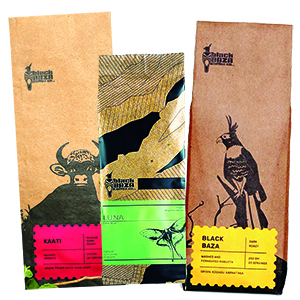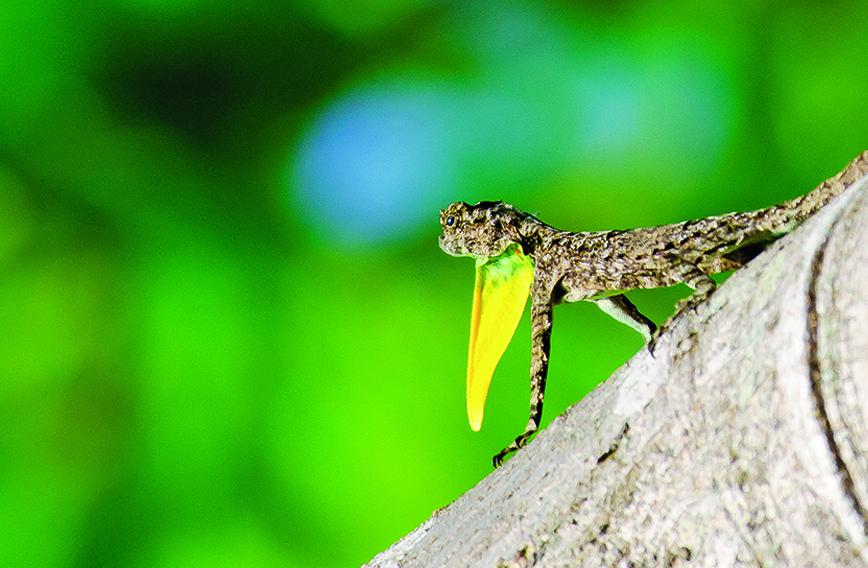
Arshiya Bose: ‘Our coffee is radical’
Putting heart into coffee
WHERE does really good coffee grow? Deep in the forest, on homesteads in the midst of nature in the Western Ghats, a biodiversity hotspot. It is a collaborative effort of birds, bees, flowers, trees, butterflies, ants, pepper vines, fallen leaves — they all go to make that brilliant cup of coffee.
Since 2016, the Black Baza Coffee Company has been sourcing coffee from very small producers in the Western Ghats and marketing it to urban consumers.
A symbiotic relationship has been in the making. You don’t just enjoy your coffee you also get to know those small growers who keep the biodiversity of the Western Ghats alive.
An annual Habba takes consumers to the BR Hills and growers. It is a coffee festival. This year on the itinerary was a Coffee Drinker’s Selfie Wall. While Black Baza has been introducing growers to buyers, it is now time for growers to know where their coffee goes and who drinks it.
There are other introductions too such as to Kaati. A full-bodied medium dark roast coffee from the Palani Hills in Tamil Nadu, Kaati is aimed at creating awareness about the gaur or Indian bison and saving mammal species. We have been buying quite a lot of it and it is a wonderful coffee.
While getting familiar with Kaati you might just like to know a thing or two about the role ants play. Check out the Ant Loop Gift Box, which is a beautifully crafted set of brewing equipment made from brass with marching ants etched on it. The brass filter is the traditional South Asian way of brewing heavy bodied and strong coffee from a fine powder.
 |
“To grow good coffee, you need ants. Ants are the reason coffee farms stay healthy and alive. They keep pest populations in check and contribute to soil richness. Plus, they are funny, cute little creatures with fascinating social structures,” we are told.
So here we are in the dusty, polluted NCR intimately connected to the exotic biodiversity of the beautiful forested areas where the coffee we drink comes from. We have coffees called Ficus, Kaati, Jumping Ant, Black Baza, Draco, Wanderoo, Chukki, Potter Wasp and more such to choose from.
The Black Baza is a bird of prey, Ficus is the beautiful fig tree, Chukki is in honour of the leopard. There is an ecological story to each coffee because when the consumer knows where it comes from justice is done to the small and anonymous grower and environment as well.
Black Baza has a motivational story to tell. Positioning itself as “diversity friendly”, Black Baza works with small growers and community groups whose holdings are meagre in size, encouraging them to be organic in their practices and respectful of nature in the traditional ways they already know.
 |
|
Ant Loop Gift Box |
In doing so, it promotes livelihoods, which might otherwise have been trampled upon in the rush to cater to markets. Growers are not only reassured that they can survive, but Black Baza also helps them compete and sell when they would otherwise have been left out. In the coffee business, the grower gets a mere 2.8 percent of the final price. Black Baza gives growers 17 percent.
The invitation to the customer is to get on board this transformational effort. It is a personalized appeal. When you buy a pack of coffee from Black Baza, it comes with your name handwritten on it. The message is: “Your cup of coffee is kinder to the environment and the grower.” You don’t just get a good cup of coffee, but you also “secure livelihoods and strengthen coffee farming practices that conserve biodiversity. We invite you to participate in the process. This is a great step one. But we can do more”.
Arshiya Bose is Black Baza’s founder. She has a Ph.D on the political ecology of markets for biodiversity conservation from Cambridge University. She was researching sustainability certifications for coffee when small producers in the Kodagu area of Karnataka reached out for support.
Black Baza really came out of the need of farmers with small holdings to engage with markets. “It was they who took the initiative, not me,” says Bose.
 In her journeys through Coorg, Bose found that Indian farmers continued to largely grow coffee under trees, thereby preserving a rich biodiversity. This was unlike other parts of the world where forests have been felled for coffee plantations.
In her journeys through Coorg, Bose found that Indian farmers continued to largely grow coffee under trees, thereby preserving a rich biodiversity. This was unlike other parts of the world where forests have been felled for coffee plantations.
“They wanted to access fairer markets and to be recognized for the good farming practices that they were already doing. They wanted a support system to enable them to farm ecologically,” says Bose.
In India, too, tree cover was being lost in keeping with the global trend. So, helping farmers retain the trees and ecology friendly practices while at the same time being profitable became a mission worth taking up.
Bose set up Black Baza Coffee Company as a private limited entity in 2016. It continues to be a business, but with well-structured ethical foundations. Its slogan reads: ‘We are an activist company. Our coffee is radical.’
She now works with 650 producers, mostly indigenous and tribal communities, to bring to consumers ‘the best of the diversity of coffee’.
Black Baza has a manifesto, which pledges the company to fair trade, authentic sourcing and ecological balance, whether it is preserving trees or eschewing use of chemicals. It is also an evolving manifesto as conversations happen.
Collaborations with farmers are defined by conservation agreements, which stipulate maintaining 100 trees per acre, protecting sources of water, reducing and abjuring use of chemicals and maintaining a certain percentage of shade so that the cutting of tree branches is restricted. Many growers have just an acre but preserving their forest cover enables them to access other produce like honey.
And what makes a good cup of coffee? Apart from forest cover and plant care, you have to pick the right beans at the right time, and ensure moisture levels are just right, explains Bose. Coffee beans then are roasted to perfection in a roastery. Each step is micro-managed.
“We set up FPOs and we work with existing ones. In Kerala, we partner Fair Trade Alliance. Governing FPOs is challenging but democratic. All our decisions are participatory which makes the experience so much richer,” says Bose.
 Talking to small growers
Talking to small growers
For small farmers, Black Baza Coffee Co is a lifeline. It has been made possible by Bose’s unique transition from academia to the marketplace. It helps them engage with the world at large in ways that preserve and promote their identities and traditional practices.
Black Baza’s brand is built on its honesty and intellectual purpose. The farmers couldn’t have hoped to do this without Bose. Equally important is Bose’s market-savvy approach. Naming coffees the way she does, is being original and claiming space in a market where others spend large sums on brand building. Black Baza sells online, and to stores and top-end hotel chains.
In a networked world someone with a real message tends to be heard and followed. For Black Baza, the first steps on that journey have been taken.
First published in December 2020 and updated
Comments
Currently there are no Comments. Be first to write a comment!




